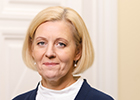Second reading of the Draft Act on Amendments to the Land Tax Act (437 SE)
Session: 15th Estonian Parliament, 3rd session, plenary session.
Date: 2024-06-12 23:47
Total Speeches: 79
Membership: 15
Agenda Duration: 1h 42m
AI Summaries: 79/79 Speeches (100.0%)
Analysis: Structured Analysis
Politicians Speaking Time
Politicians
Analysis
Summary
Agenda item 12 concerned the draft act amending the Land Tax Act, initiated by the Government of the Republic to the Riigikogu. The objective of the draft act is to increase the autonomy of local governments regarding the establishment of land tax exemptions and taxation limits, offering local councils greater decision-making power and instruments for shaping the taxation of landowners. The Finance Committee discussed the draft act, collected numerous proposals, and prepared significant amendments, focusing on both growth limits and restrictions on the functioning of tax exemptions. Generally, the discussion raised questions about the impact on landowners, agriculture, and the financial sustainability of local government, and the main topics of debate were the 10–100% growth limit, the abolition of minimum rates, and the interplay of tax opportunities and obligations.
In the second part, the discussion highlighted legal certainty and socio-economic impacts, as well as divisions between the coalition and the opposition: some factions were skeptical about the potential consequences of the draft act regarding increased land tax and the burden on residents and entrepreneurs, while others advocated for greater responsibility for local governments and a directly targeted revenue base. Finally, a decision was reached concerning the continuation of the bill's proceedings and the completion of the second reading—the motions to interrupt the second reading of Bill 437 did not receive the necessary support, and the second reading of the bill was concluded, although the debate on the motives for the adopted or unadopted behavior was expressed in the form of final reactions.
Decisions Made 1
The continuation of the second reading of Draft Bill 437 was carried out by a vote, and the proposals for interruption (submitted by three factions – EKRE, Isamaa, Keskerakond) failed to gain support. The result of the vote was: 12 in favor, 53 against, with no abstentions. Consequently, the second reading was concluded, and the progress of the draft bill will continue according to standard procedure.
Most Active Speaker
The most active speaker: Aivar Kokk (Isamaa). He is a right-wing, constituency-focused politician whose contribution covered several questions and critical clarifications regarding the draft legislation and the committee lines; he actively participated in the public debate and represented the faction’s positions, emphasizing the impact of autonomy and the potential increase in the tax burden on local governments and businesses.
Esimees Lauri Hussar
AI Summary
Chairman Lauri Hussar announced that the 12th item on today's agenda is the bill on amending the Land Tax Act, initiated by the Government of the Republic, and Jürgen Ligi, a member of the Riigikogu Finance Committee, is already at the rostrum.
Jürgen Ligi
AI Summary
The Finance Committee discussed the draft bill, which grants local governments the right to independently decide on land tax exemptions, decided on the motion to conclude the second reading, and addressed the proposals submitted by Isamaa and EKRE (Isamaa attempted to render the regulation meaningless, while EKRE submitted over 200 proposals). The Committee noted that tax exemptions are the least productive instrument for social and family policy, made three amendments (including establishing a ceiling for the annual increase of land tax and abandoning the minimum rate), and considered it necessary to limit the land tax increase to approximately 10%, maintaining close contact with interest groups.
Esimees Lauri Hussar
AI Summary
The Chairman thanked the speaker and invited questions, turning to Aivar Kokk.

Aivar Kokk
Profiling Isamaa fraktsioonAI Summary
Aivar Kokk voices concern that failing to fix the error leaves the obligation unclear: namely, that local governments must raise the land tax by at least 10% annually until the cap is reached. He also questioned whether this now means an increase of anywhere from 10% to 100% could occur every year.
Jürgen Ligi
AI Summary
Jürgen Ligi apologized for his absence from that committee meeting, stating that he had not realized such a requirement was being planned. He noted that the draft legislation contains "at least 10%," which he believes causes confusion, and added that if anyone was more knowledgeable on the subject, they were welcome to address the topic during the presentation.
Esimees Lauri Hussar
AI Summary
Chairman Lauri Hussar invites Andrei Korobeinik to take the floor.

Andrei Korobeinik
Profiling Eesti Keskerakonna fraktsioonAI Summary
Andrei Korobeinik asks Jürgen why tax exemptions, including the exemption for the land under one's home, which they once happily supported, no longer seem effective, and whether their previous vote was insincere.
Jürgen Ligi
AI Summary
Jürgen Ligi asserts that the question was insincere, stating that he has never supported it and has publicly declared from the Riigikogu podium that it is a very foolish exemption. He also points out that the Centre Party was against it and asks whether the speaker is representing the Reform Party or his own party.
Esimees Lauri Hussar
AI Summary
The Chairman called Priit Sibul to the stage.

Priit Sibul
Profiling Isamaa fraktsioonAI Summary
Priit Sibul raises a question regarding the 10–100% limit arising from subsection 1, point 8 of the draft amendment to the Land Tax Act, and requests a common interpretation from the Minister and the Committee as to whether the local council can increase the land tax annually only permissibly or also obligatorily, and seeks confirmation of the previous divergence of views.
Jürgen Ligi
AI Summary
Jürgen Ligi stated on behalf of the committee that there is no actual obligation; although the mark grants a right, the boundaries do not impose an obligation. He added that he has understood this all along, and the committee chairman confirmed the same to him.
Esimees Lauri Hussar
AI Summary
This is a brief announcement in which Chairman Lauri Hussar asks Madis Kallas to come forward.

Madis Kallas
Profiling Fraktsiooni mittekuuluvad Riigikogu liikmedAI Summary
The speech stated that starting in 2026, local governments have the option to set a limit on the increase of land tax (10%, 20%, 90%, or 100%). However, this is not mandatory and does not reflect the actual amount by which the land tax will increase.
Jürgen Ligi
AI Summary
Jürgen Ligi emphasizes that although the right (to set the limit) is not an obligation, and the ceiling has been established for reassurance, the land tax is a natural tax that covers limited resources and public expenditures. Furthermore, it could be tied to removing certain obligations from the citizen (e.g., snow removal), but he hasn't yet managed to formalize this point, and it only reflects the commission's discussion, not his personal opinion.
Esimees Lauri Hussar
AI Summary
The Chairman thanks the previous speaker and invites Maido Ruusmann to take the floor.

Maido Ruusmann
Profiling Fraktsiooni mittekuuluvad Riigikogu liikmedAI Summary
Maido Ruusmann noted that this is a very important and necessary amendment, one that increases the autonomy of local governments when shaping their revenue base. He also expressed astonishment regarding EKRE's 200 proposed amendments and questioned whether their aim was to stall the entire legislative change or if there was some other motive behind it.
Jürgen Ligi
AI Summary
Jürgen Ligi pointed out that EKRE attempts to be an anti-establishment party regardless of the bill's content, thereby slowing down the process, and that parliament must not bring the country to a standstill.
Esimees Lauri Hussar
AI Summary
The Chairman called Aivar Kokk to speak.

Aivar Kokk
Profiling Isamaa fraktsioonAI Summary
Aivar Kokk claims that the draft bill strips local governments of their decision-making power and stipulates that land tax must be raised by at least 10% annually. Furthermore, he accuses the minister and the finance committee of lying and of failing to rectify the error.
Jürgen Ligi
AI Summary
Jürgen Ligi stated that the general provision allows for something to be enacted, and the subordinate provision describes how to implement it. He added that the state does not strictly mandate that anything be enacted, and that he was not lying, but merely explaining the intent of the draft bill.
Esimees Lauri Hussar
AI Summary
Chairman Lauri Hussar called upon Priit Sibul.

Priit Sibul
Profiling Isamaa fraktsioonAI Summary
Priit Sibul asks how predictable the results of the land tax change assessments are, what the content of the next assessment in 2026 will be, what the actual cost is for the land entrepreneur, and whether the land tax should be viewed as a tool of local government policy or in the context of the land entrepreneur, environmental, and agricultural policy.
Jürgen Ligi
AI Summary
Jürgen Ligi argues that the land tax is generally beneficial for the economy, being a tax on a limited resource, but local governments do not dare to make decisions and blame the state, due to which funding suffers. Furthermore, although taxes could stimulate the market, cheap land and taxation do not make local governments rich—you shouldn't expect such a major breakthrough.
Esimees Lauri Hussar
AI Summary
Chairman Lauri Hussar addresses Mart Maastik and asks him to take the floor.

Mart Maastik
Profiling Fraktsiooni mittekuuluvad Riigikogu liikmedAI Summary
Maastik expressed concern that raising the land tax would force local governments to pay more due to budget problems, harm agriculture, and create a chain reaction, and asked whether its impact had been seriously considered.
Jürgen Ligi
AI Summary
Jürgen Ligi refers to an economic theory stating that in a limited resource market, land use shifts toward a more efficient direction, and a moderate tax is beneficial for economic growth. This is because agricultural businesses vary, and buyer and seller positions can shift depending on who is willing and able to pay more, provided the owner receives adequate revenue.
Esimees Lauri Hussar
AI Summary
Chairman Lauri Hussar calls upon Mart Maastik to speak.

Mart Maastik
Profiling Fraktsiooni mittekuuluvad Riigikogu liikmedAI Summary
Mart Maastik warns that taxation forces land use to focus on short-term profit, such as the cultivation of hemp, which depletes the soil in three to four years and threatens Saaremaa's agriculture.
Jürgen Ligi
AI Summary
Jürgen Ligi stresses the long-term view: the land must be kept in good condition and not depleted, because otherwise the asset will be lost, and rapid degradation is not beneficial to the farmer.
Esimees Lauri Hussar
AI Summary
Chairman Lauri Hussar asks Annely Akkermann to speak.

Annely Akkermann
Profiling Eesti Reformierakonna fraktsioonAI Summary
Annely Akkermann raised the point that Section 81 stipulates that if the amount of land tax is at least 10% greater than in the previous taxation period, the tax increases by 10%, and the new wording grants the local government council the right to establish the annual land tax increase limit at 10–100%.
Jürgen Ligi
AI Summary
Jürgen Ligi heard the limit for the increase, thanked them for the assistance, and said he was unable to read the text from the other end of the hall.
Esimees Lauri Hussar
AI Summary
Chairman Lauri Hussar expressed his thanks, noting that while clarity had been reached, the questions remain on the table, and he then called upon Maido Ruusmann.

Maido Ruusmann
Profiling Fraktsiooni mittekuuluvad Riigikogu liikmedAI Summary
Maido Ruusmann asks if the main objective of the bill is to grant local municipalities greater autonomy in setting taxes—meaning it's not simply a tax hike—and whether the core focus of the debate is genuinely about increasing autonomy or something else entirely.
Jürgen Ligi
AI Summary
Greater autonomy is a step towards a more sensible tax policy and land use, because limited resources demonstrate that people cannot purchase them as freely as they can unlimited ones, and consequently, taxes are beneficial to the economy.
Esimees Lauri Hussar
AI Summary
The Chairman calls upon Helir-Valdor Seeder to speak.

Helir-Valdor Seeder
Profiling Isamaa fraktsioonAI Summary
Helir-Valdor Seeder criticizes the commission's work as a circus, emphasizes the principle of legal certainty, and asks whether the land tax rules recently adopted for landowners can change before taking effect, and whether the president will promulgate them.
Jürgen Ligi
AI Summary
According to Jürgen Ligi, the topic is not a circus; it is a serious discussion. Legal certainty remains, the right to impose taxes exists, and the state and local governments may revise decisions and change tax rates due to financial conditions. However, changes must not occur within a six-month period, because the state's financial sustainability is in the interest of the citizens.
Esimees Lauri Hussar
AI Summary
Chairman Lauri Hussar calls upon Andres Metsoja.

Andres Metsoja
Profiling Isamaa fraktsioonAI Summary
Andres Metsoja asks whether the amendment to the Land Tax Act replaces the previous 0–10% restriction with a new 10–100% one, and whether this means that municipalities will no longer have the option of allowing only zero or a very small increase.
Jürgen Ligi
AI Summary
Jürgen Ligi said that even though he hadn't managed to follow the whole thing or compare it against the text, the statement seemed entirely sensible to him.
Esimees Lauri Hussar
AI Summary
Chairman Lauri Hussar politely addresses Madis Kallas and asks him for something.

Madis Kallas
Profiling Fraktsiooni mittekuuluvad Riigikogu liikmedAI Summary
I am asking whether, starting from 2026, a local municipality can establish a maximum annual land tax increase limit of 10% by regulation.
Jürgen Ligi
AI Summary
Jürgen Ligi said that starting in 2026, the freedom (or autonomy) that was included in the original draft bill will take effect, and local governments will have the right to an increase of up to 10%.
Esimees Lauri Hussar
AI Summary
Speaker Lauri Hussar calls upon Helir-Valdor Seeder.

Helir-Valdor Seeder
Profiling Isamaa fraktsioonAI Summary
Helir-Valdor Seeder discusses whether the limit for the increase could be 5%, noting that currently 10–100% applies, and therefore 5% is impossible.
Jürgen Ligi
AI Summary
He thinks it might be under ten percent, but the bill and its wording aren't very clear to him. Even though they struggled to make sense of it, they eventually made a decision.
Esimees Lauri Hussar
AI Summary
Chairman Lauri Hussar thanked the rapporteur, announced that there were no further questions, opened the debate, and invited Andrei Korobeinik to the Riigikogu rostrum.

Andrei Korobeinik
Profiling Eesti Keskerakonna fraktsioonAI Summary
Andrei Korobeinik is criticizing the Reform Party’s plan to increase land tax and grant local municipalities greater autonomy, arguing that the supposed autonomy is just a pretense and that simply distributing money does not compensate for the state’s capacity. He calls on the Centre Faction to terminate the proceedings on the bill and urges the Reform Party to heed Andrus Ansip’s message and step aside.
Esimees Lauri Hussar
AI Summary
Riigikogu Speaker Lauri Hussar called Arvo Aller to the podium, noting that Jürgen Ligi would quickly receive the floor for a reply, and following that, the debate would continue from the rostrum.
Jürgen Ligi
AI Summary
Jürgen Ligi explains that relating the caps on the land tax increase to the caps on the price increase creates rather complicated wording, and for this reason, he was unable to answer all the questions quickly.
Esimees Lauri Hussar
AI Summary
The Chairman thanks the audience and invites Arvo Aller to speak next.

Arvo Aller
Profiling Fraktsiooni mittekuuluvad Riigikogu liikmedAI Summary
Arvo Aller stated that the draft bill increasing the local government land tax has been incorrectly prepared and debated, noting that there was a lack of attendance in the committee and important substantive amendments were ignored. This puts land ownership, food security, and national security at risk. Therefore, EKRE does not support the bill and demands that the second reading be terminated.
Esimees Lauri Hussar
AI Summary
The Chairman called Priit Sibul to the Riigikogu podium.

Priit Sibul
Profiling Isamaa fraktsioonAI Summary
Priit Sibul stated that the draft bill lacks a clear forecast, and the impact of the tax increase on rural entrepreneurship and local governments is unpredictable. Consequently, he does not support the bill or its advancement to the third reading.
Esimees Lauri Hussar
AI Summary
The faction requests the floor of the Riigikogu, and Aivar Kokk will deliver a speech on its behalf.

Aivar Kokk
Profiling Isamaa fraktsioonAI Summary
Aivar Kokk claims that the draft bill will lead to a 10–100% increase in land tax, arguing that it is based on an eight-fold rise in land prices. He accuses the coalition and the minister of lying, and states that the planned autonomy is actually binding and will cause financial damage, particularly to homeowners and farmers.
Esimees Lauri Hussar
AI Summary
Chairman Lauri Hussar said that there are three minutes of extra time.

Aivar Kokk
Profiling Isamaa fraktsioonAI Summary
Aivar Kokk claims that the coalition neither understood nor implemented the necessary amendments, and the flaw in the Land Tax Act increases the tax burden on individuals and entrepreneurs. Therefore, Isamaa wishes to halt the second reading in order to ensure a 0% increase and the correction of the law.
Esimees Lauri Hussar
AI Summary
Madis Kallas is invited to the Riigikogu rostrum, and his address is delivered on behalf of the Social Democratic Party faction.

Madis Kallas
Profiling Fraktsiooni mittekuuluvad Riigikogu liikmedAI Summary
Madis Kallas emphasized that a 10% growth limit is not growth, and local governments must be given more decision-making power without additional burdens, because he trusts all 79 local governments and wishes to maintain the tax valuation rate for agricultural land at 0.5%.
Esimees Lauri Hussar
AI Summary
The Chairman thanks [the previous speaker] and invites colleague Mart Maastik to the Riigikogu rostrum to deliver the next address.

Mart Maastik
Profiling Fraktsiooni mittekuuluvad Riigikogu liikmedAI Summary
Mart Maastik is criticizing yet another tax hike and the resulting tax cascade, which forces municipalities to raise land tax, thereby threatening rural areas, agriculture, the local economy, and consequently, the sustainability of the state.
Esimees Lauri Hussar
AI Summary
Chairman Lauri Hussar requested three minutes of extra time.

Mart Maastik
Profiling Fraktsiooni mittekuuluvad Riigikogu liikmedAI Summary
Mart Maastik notes that the state establishes regulations and increases taxes, which forces entrepreneurs to cut costs and often leads to bankruptcy, while international funds buy up our land to gain control. Therefore, such bills must not be supported, and we must start thinking like masters in our own country.
Esimees Lauri Hussar
AI Summary
The Chairman thanks [the previous speaker] and next invites his colleague Andres Metsoja to the Riigikogu rostrum to speak.

Andres Metsoja
Profiling Isamaa fraktsioonAI Summary
The author of the report, Andres Metsoja, emphasizes that the increase in land tax affects prices and the economy. Furthermore, in the case of land under nature protection, the local municipality loses revenue, which necessitates compensation or support mechanisms from the state. Nevertheless, the owner's perspective is the most crucial, because owners are the ones who develop Estonia.
Esimees Lauri Hussar
AI Summary
Chairman Lauri Hussar requests three minutes of extra time.

Andres Metsoja
Profiling Isamaa fraktsioonAI Summary
According to Andres Metsoja, during the green transition, the food industry, agriculture, and forestry are in a precarious situation, and Natura 2000 restrictions combined with the new draft bill impose an additional burden and taxes on landowners, potentially driving the owner further away from the state and tax compliance, which he does not support, and the bill should therefore be rejected.
Esimees Lauri Hussar
AI Summary
The Speaker thanks [the previous speaker/assembly], invites Anastassia Kovalenko-Kõlvart to the Riigikogu rostrum, and requests three minutes of additional time.

Anastassia Kovalenko-Kõlvart
Profiling Eesti Keskerakonna fraktsioonAI Summary
Anastassia Kovalenko-Kõlvart asserts that the land tax hike and the abolition of the home-adjacent land tax exemption, both adopted by the coalition, will exacerbate inequality, threaten the principle of the inviolability of the home, and undermine the financial stability of pensioners and young families. She adds that these measures grant local governments an additional revenue stream, which ultimately puts the state's legal certainty at risk.
Esimees Lauri Hussar
AI Summary
The Chairman thanked the previous speaker and invited Anti Allas to the rostrum. Anti Allas requested an extension, and the Riigikogu granted three minutes.

Anti Allas
Profiling Fraktsiooni mittekuuluvad Riigikogu liikmedAI Summary
Anti Allas emphasized that the regular land tax assessment, which has not been carried out for 21 years, has fallen below the revenue base of local governments, and a balanced solution must be found. This solution requires that the land tax base, taxable value, and concessions be determined by a joint decision of the community and the council, ensuring that the tax increase is not too rapid and does not harm entrepreneurship or the residents' ability to cope.
Esimees Lauri Hussar
AI Summary
The Chairman thanks [the previous speaker], invites Helir-Valdor Seeder to the podium, and immediately grants him three minutes of extra time.

Helir-Valdor Seeder
Profiling Isamaa fraktsioonAI Summary
Helir-Valdor Seeder criticizes the handling of the draft Land Tax Act as superficial and uncertain, emphasizing that it affects landowners, homeowners, and entrepreneurs, increases the revenue inequality among local governments, and is being implemented retroactively. He therefore calls for the procedure to be halted and the text to be made unambiguously clear and legally sound before the vote.
Esimees Lauri Hussar
AI Summary
The Chairman thanked [the attendees], invited Aivar Kokk to the podium, and stated that this time he wished to take the floor on his own behalf.

Aivar Kokk
Profiling Isamaa fraktsioonAI Summary
Aivar Kokk warned that starting from 2025, the taxable value of residential land and agricultural land will increase by 0.5%–1%, and other land by 1%–2%. Local government councils will establish the maximum annual land tax increase limit, ranging from 10% to 100%, no later than October 1st of the year preceding the taxation period, noting that 0% or 0–10% is not permitted. Furthermore, if the Social Democrats win, the tax exemption for land under the home will be abolished starting in 2026, and the land tax will rise.
Esimees Lauri Hussar
AI Summary
Chairman Lauri Hussar informed the chamber that 15 amendments must be reviewed to conclude the second reading of Draft Bill 437, noting that most of these are not subject to a vote. Furthermore, concerning three identically worded proposals—submitted by the EKRE, Centre Party, and Isamaa factions—a motion will be put forward to interrupt the second reading, on which members are asked to take a stance and vote.
Esimees Lauri Hussar
AI Summary
Twelve members of the Riigikogu voted in favor of the proposal, 53 were against, and there were no abstentions; the proposal failed to gain support, and the second reading of Draft Bill 437 is concluded.